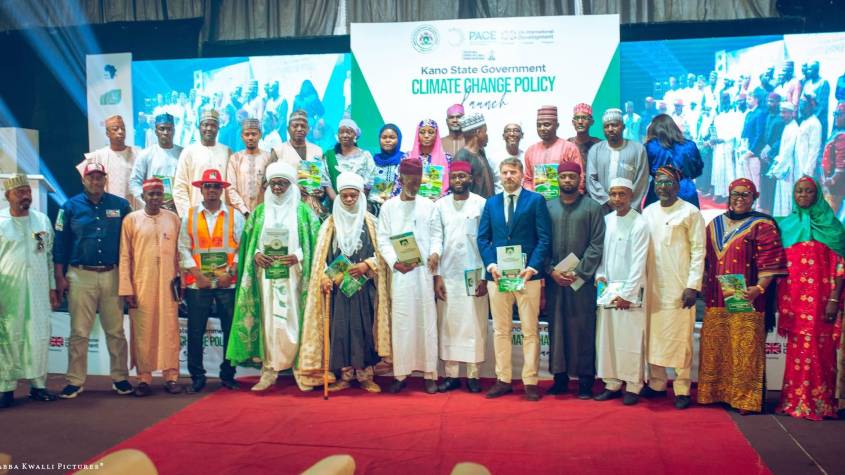Day Kano Launched its Climate Policy for a Resilient Future
The newly launched Kano State Climate Change Policy seeks to translate political commitment into a practical, coordinated roadmap focused on green energy development, sustainable land use, climate finance, and community resilience.
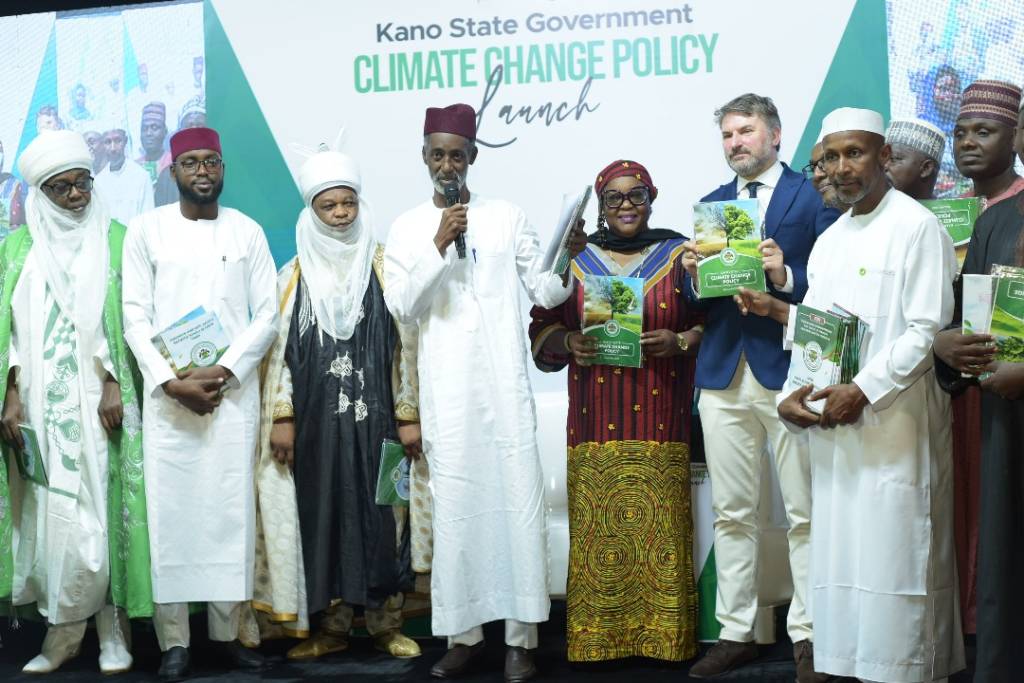
Kano state is among the few subnational governments in Nigeria that have proactively developed a Climate Change Policy aimed at advancing environmental sustainability and resilience. Spearheaded by the Kano State Ministry of Environment and Climate Change, the policy aligns the state’s development aspirations with national and global climate goals—marking a strategic shift from reactive responses to long-term, locally driven solutions.
It was against this backdrop the Kano State Government, in collaboration with the Partnership for Agile Governance and Climate Engagement (PACE), the National Council on Climate Change Secretariat, and UK Foreign, Commonwealth and Development Office (UK-FCDO), last week hosted an official launch of the state’s Climate Change Policy.
The launch event marked a significant step in Kano’s strategic response to climate risks and emerging opportunities and aimed to raise stakeholder awareness, galvanize broad-based support, and foster collaboration for the inclusive and effective implementation of the policy. It was also a demonstration of strong political will and institutional readiness to steer the state toward climate-resilient development.
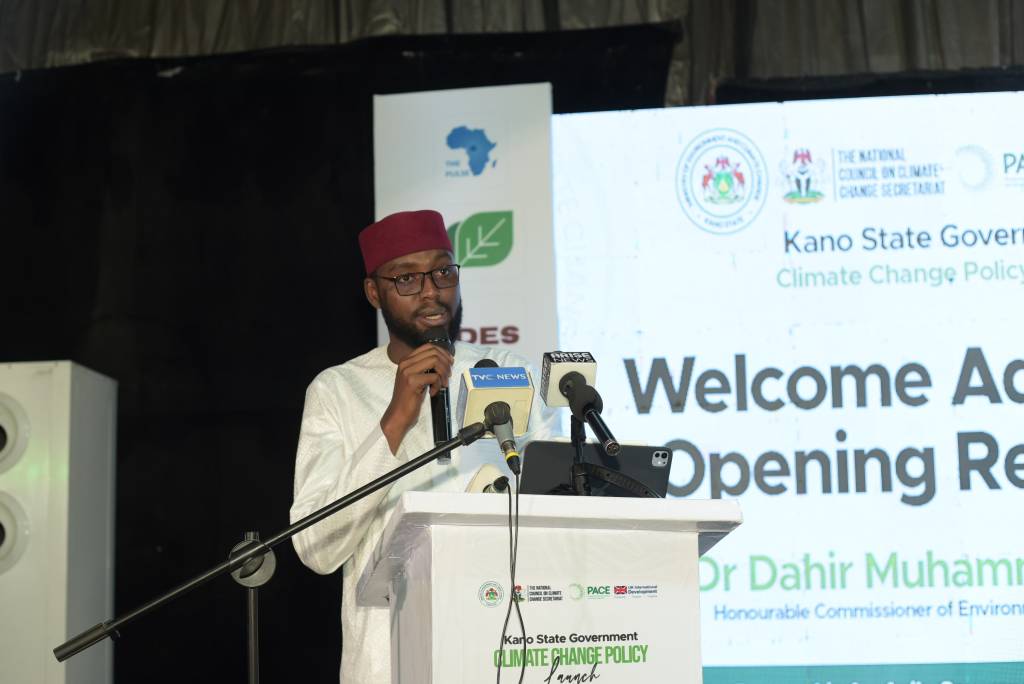
“We’ve Chosen the Path of Climate Responsibility, Resilience” – Commissioner
While delivering his opening remarks at the launch of the Climate Change Policy, Dr. Dahir Hashim, Commissioner for Environment and Climate Change, declared the state’s bold commitment to climate action and building a resilient future, describing the launch as a major milestone in Kano’s efforts to institutionalize strong climate governance.
“Today, Kano State sent a clear message to Nigeria, to Africa, and the global community. We have chosen the path of climate responsibility and resilience. The launch of this policy is not an isolated event—it’s part of the climate governance we’ve been building since the beginning of this administration,” Dr. Hashim said.
The Commissioner said the newly launched policy provides a strategic roadmap for climate mitigation, adaptation, and inclusive governance across key sectors—from agriculture and health to transport and energy. He said Kano is one of the few state governments in northern Nigeria to develop a climate policy that incorporates community voices and gender-sensitive frameworks.
Dr. Hashim also announced the inauguration of the Kano State Climate Change Steering Committee—a high-level, multi-sectoral body tasked with driving the implementation, coordination, and accountability of climate action across the state. “We are equally proud to unveil two critical legislative instruments that will strengthen Kano’s environmental protection framework.”
The new environmental protection laws the Commissioner referred to are the Kano State Environmental Protection Law and Kano State Environmental Pollution and Waste Control Regulation 2025, which were also unveiled during the event. Published in both English and Hausa, the laws aim to empower the state to address pollution, protect public health, and uphold environmental standards through enforceable legal measures.
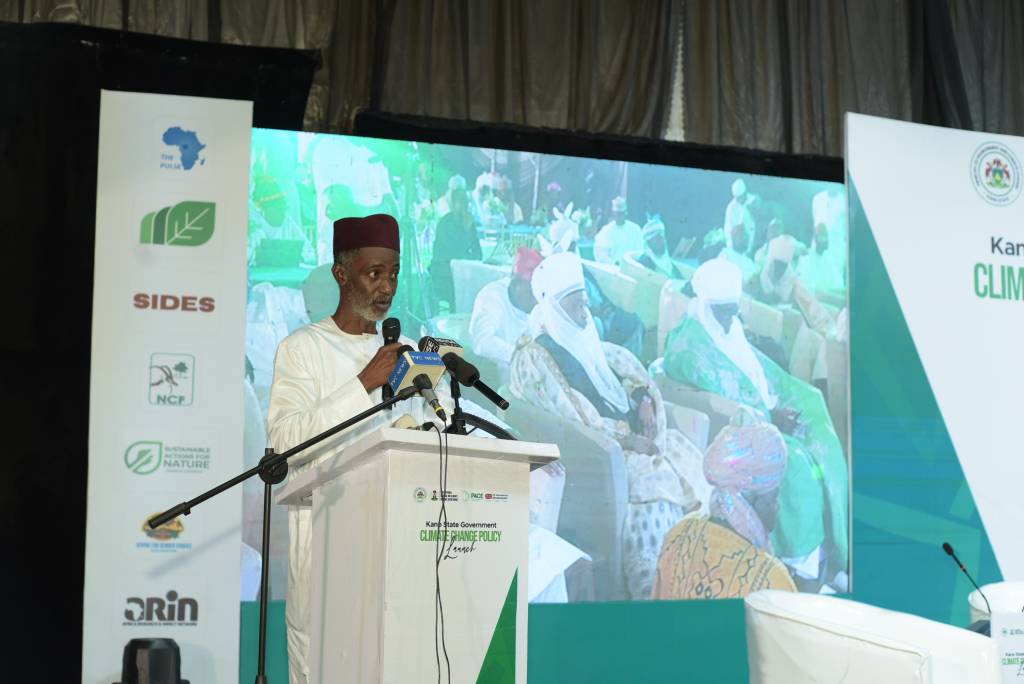
“We’ll Translate Political Will into Coordinated Climate Action” – SSG
Representing the Kano State Governor, Alh. Abba Kabir Yusuf, at the policy launch event, was the Secretary to the State Government (SSG), Mallam Umar Farouk Ibrahim, who reiterated the state’s unwavering commitment to environmental sustainability, proactive climate stewardship, and institutional readiness to address the growing climate crisis.
The Kano SSG said the newly launched Climate Change Policy is backed by a comprehensive action plan that focuses on key priority areas, including green energy, sustainable land use, climate finance, and community resilience. This action plan is designed to move beyond rhetoric—translating political will into a coordinated and impactful implementation roadmap.
“The policy we’re launching today is complemented by a climate change action plan that translates our political commitment into a practical and coordinated implementation path that focuses on building green energy, sustainable land use, climate finance, and community resilience,” Mallam Ibrahim stated.
He further noted that the policy and its action plan will serve as a guiding framework for government institutions, private sector actors, and development partners alike—ensuring collaborative delivery of tangible climate solutions across the state.
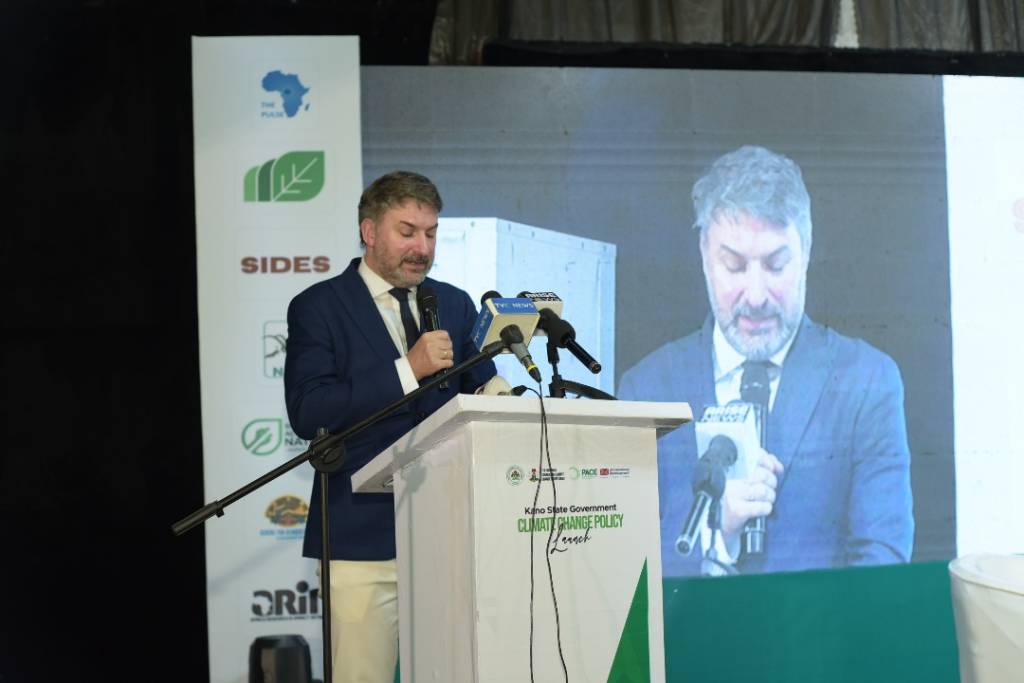
“Policy Without Action a Mere Promise” – British High Commission Rep
In his keynote at the launch, Mr. William Robinson, Head of Governance & Sustainability at the British High Commission in Abuja, emphasized the critical need for developed countries to support developing nations in confronting climate change, framing climate justice as a moral imperative and shared global responsibility.
Robinson said Kano’s climate policy launch has the potential to drive environmental action that unlocks green economic growth, investment, and community empowerment in Nigeria’s most populous state. “This is an inspiring example of how environmental action can drive economic opportunity. Policies like this one can catalyze investment, empower communities, and support green growth — if implemented effectively and backed by strong partnerships.”
However, he stressed that effective implementation and strong partnerships are essential to realizing these benefits. “Climate change knows no borders. The choices we make today will shape the world our children inherit. Let us work together — across governments, sectors, and continents — to protect our planet and uplift our people.”
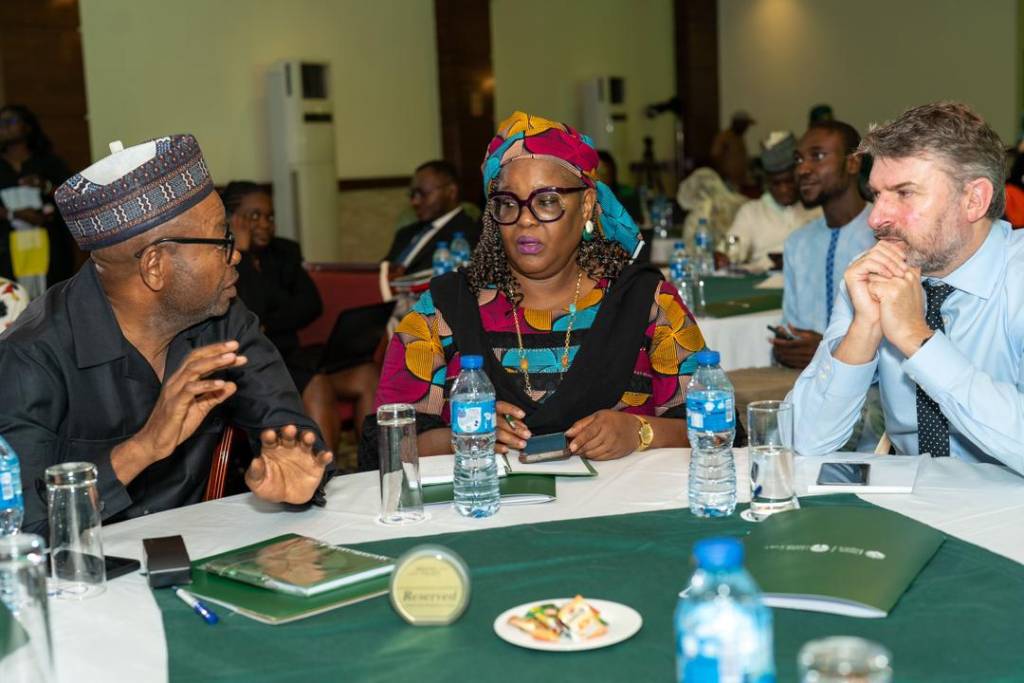
“Climate Policy a Bold Move to Confront Climate Crisis” – PACE Deputy Chief
Dr. Titilope Fakoya, Deputy National Team Leader of the Partnership for Agile Governance and Climate Engagement (FCDO-PACE), expressed her delight at the launch of the Kano State Climate Change Policy, describing it as a testament to the power of collaboration, political will, and an inclusive understanding of climate change’s impact on vulnerable communities.
“Today’s launch is more than a policy moment. It is a bold declaration of intent – a clear signal that Kano is ready to act, to lead, and to collaborate in the face of the climate crisis,” Dr. Fakoya said. “PACE is proud to have walked this journey with the state – supporting the design, consultation, validation, and now, the operationalisation of this policy. This achievement reflects what’s possible when ambition aligns with strong political commitment.”
Dr. Fakoya noted that the launch aligns with the UK Government’s global commitment to climate justice, inclusive governance, and locally led adaptation. It also echoes the core principles guiding PACE’s work across Nigeria: putting people at the heart of policy and ensuring that those most affected by climate decisions are not merely consulted, but actively engaged as co-creators.
She concluded with appreciation to UNICEF and sister FCDO-funded programmes – Propcom+, Lafiya, and PLANE – for their contributions to this milestone. “As we move from policy to action, PACE remains committed to supporting the next phase – strengthening systems for implementation. Because policy without action is only a promise. Together, let us turn this policy into real impact – for the people of Kano, and a more resilient future.”
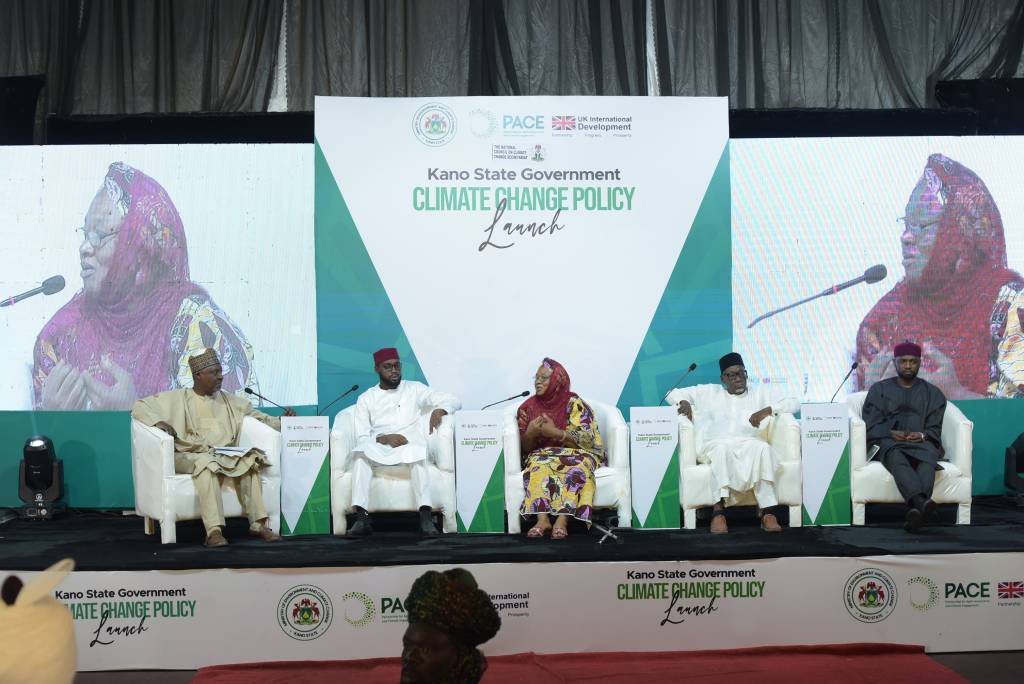
Building Resilience Through Local Knowledge
The event featured a panel discussion titled “Climate Action in Kano – From Policy to Practice: Building Resilience Through Policy and Local Knowledge,” where panelists explored how effective climate action in Kano can be sustained by harmonizing policy frameworks with indigenous knowledge systems, emphasizing the value of integrating traditional practices with modern climate solutions.
Discussions underscored that translating climate policy into actionable steps requires strong political will, institutional reform, and effective stakeholder coordination. The panel addressed challenges such as inter-agency coordination gaps, unreliable energy supply, and waste management inefficiencies, while advocating for inclusive governance, active community participation, and the involvement of traditional leadership structures and strategic partnerships are essential to long-term resilience and impact.
The event also included a climate-focused talent showcase by StartUp Kano, where digital e-waste enterprises operating in Kano metropolis demonstrated innovative solutions for e-waste management. These companies illustrated how community-led e-waste collection and recycling efforts can significantly reduce the environmental footprint and contribute to local climate mitigation strategies.
You can download a copy of the English version of the Kano State Climate Change Policy here.

